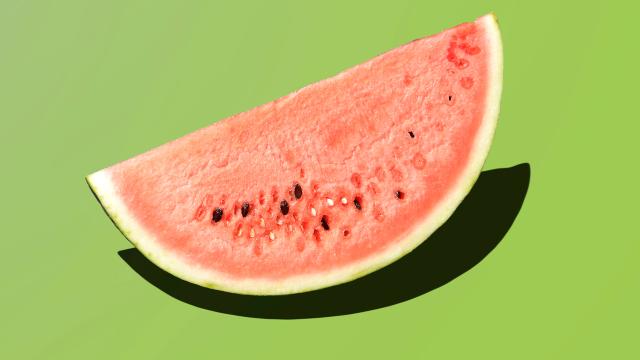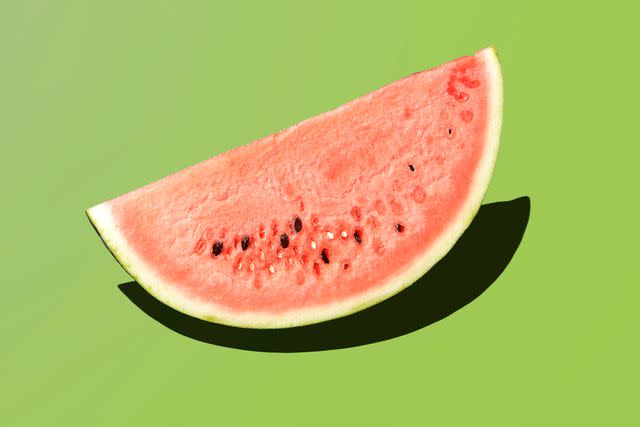6 "Bad" Fruits You Should Be Eating, According to a Dietitian

Are all fruits good for you or should you limit certain ones?
Reviewed by Dietitian Maria Laura Haddad-Garcia
Whether you want to lose weight, monitor your blood sugar levels or simply look out for your health, you may have a running mental list of off-limits foods. While many people reach for more fruit to improve their health, some may skip certain types, fearing they will sabotage their wellness goals.
Thankfully, there's no need to avoid eating whole fruits, despite some having a bad reputation for being too sugary. Here at EatingWell, we believe all fruits fit into a healthy eating pattern, and they offer too many potential benefits for you to avoid them entirely.
Related: 7 "Bad" Foods You Should Be Eating
Is Fruit Sugar Bad for You?
It's common knowledge that added sugar could be harmful in excessive amounts. However, fruits naturally contain sugar called fructose, and the difference between natural sugars and added sugars can be confusing.
Fruits are generous in good-for-you nutrients. Dietary fiber, vitamins, minerals, antioxidants, polyphenols and phytonutrients give them the power to help combat inflammation and disease, support weight management and enhance immune health.
There is even evidence that meeting your fruit (and veggie) quota can improve mental health, per a 2020 review in Nutrients.
Many people with diabetes think they have to avoid fruit. But according to the American Diabetes Association, most fruits are low glycemic, due to their fiber and fructose content, and can be enjoyed as part of a balanced diet.
Related: Can People with Diabetes Eat Fruits?

6 "Bad" Fruits You Should Eat
Here are six fruits that people tend to avoid, thinking they're too high in sugar. But each one offers a wealth of nutrition that you're missing out on by neglecting them. Hopefully, this list redeems these six "bad" fruits, and you accept them back into your family of fruits to enjoy.
1. Watermelon
As one of the heaviest fruits out there, this mouthwatering summertime staple offers many must-have nutrients. Watermelon is chock-full of antioxidants like lycopene, which is responsible for its pinkish-red color. Lycopene is a carotenoid that your body can't make on its own and must get from food.
According to a 2020 article in Nutrients, lycopene is one of the most potent anti-inflammatory nutrients that offer protection against developing diseases. This may be why research, like the 2022 review in the International Journal of Molecular Sciences, suggests that lycopene has cardioprotective qualities. In other words, it can help protect against heart disease.
And lycopene may even help protect you from getting diabetes, per a 2020 review in Pharmacological Research.
Potassium and calcium are also found in reasonable amounts in watermelon. And if you need one more reason to eat it, 1 cup of diced watermelon offers a half-cup of water, per the USDA.
In-season watermelon bursts with its signature flavor. Enjoy this hydrating fruit simply with a squeeze of lime or in a dish like our Watermelon & Arugula Salad.
2. Oranges
Oranges are famously known as the go-to source of vitamin C—and rightfully so. A medium orange (about 5.5 ounces) offers nearly 100% of your daily vitamin C, per the USDA.
Vitamin C is one of the vitamins that also acts as an antioxidant. Research, such as a 2023 review in Cureus, suggests that vitamin C serves as an immune defender on multiple fronts. It protects against harmful pathogens by strengthening the skin's natural barriers. It also shields the body from oxidative stress and inflammation, which can wreak havoc on your health.
This sweet juicy fruit is also a good source of dietary fiber which will help keep you full longer, and vitamin A which supports healthy vision. Oranges are also a natural source of folate for brain and nerve health.
Opt for whole oranges over orange juice to reap the fruit's fiber benefits. Try our Cinnamon Oranges for a tasty plant-based treat.
3. Mangoes
Known as the king of fruits, according to a 2021 article in the International Journal of Environmental Research and Public Health, mangoes are cultivated and enjoyed worldwide. In fact, thanks to their sweet, fruity taste, mangoes are the most popular dessert across the globe.
Besides being delicious, mangoes are rich in vitamins A and C, potassium, folate and fiber, per the USDA.
In addition, you'll glean an impressive amount of polyphenols, natural compounds found in produce, tea and chocolate. These powerful plant compounds can favorably influence health by improving blood pressure, inflammation, cardiovascular health and insulin resistance, per a 2022 review in the Journal of Food Biochemistry.
Eating mangoes has also been linked with better diet quality overall, lower added sugar intake and healthier weight, per a 2022 review in Nutrients.
Including mangoes in your diet means you'll get plenty of carotenoids, including beta carotene and lutein, which give mangoes their vibrant yellow-orange shade. Mangoes offer a smooth, sweet and tropical flavor sure to awaken your taste buds.
Bring the tropics to your kitchen with our Mango & Spinach Smoothie or Shrimp with Mango & Basil recipes.
4. Pineapples
Who needs an air freshener when you have fruit? Another popular tropical fruit, pineapples infuse the air with their sweet aroma as soon as they're cut open. And while some people avoid pineapple because of its sweetness, they're just as nutritious as they are succulent and can fit into any healthy eating plan (as long as you're not allergic).
Like mangoes, pineapples pack an impressive punch of polyphenols to help safeguard against inflammation, per a 2020 review in Food Research International. Brimming with vitamin C, 1 cup of pineapple gets you very close to reaching 100% of your daily needs, according to the USDA. And not only is pineapple full of antioxidants, but it packs folate, potassium and calcium too.
Another perk of pineapple is that it contains an enzyme called bromelain, which aids your gut with digestion. Bromelain also helps break down protein, making it a great meat tenderizer. For this reason—and because it adds a fruity tropical flavor—pineapple juice is a great ingredient to include in marinades.
If you love fresh pineapple but avoid it because it makes your mouth and tongue hurt, you can also thank bromelain for that. Try soaking fresh pineapple in lightly salted water for about a minute to help activate the bromelain, and by the time it reaches your mouth, it will have been inactivated. If you don't like the taste of lightly salted pineapple, try cooking it (we love it grilled!), which has the same outcome. This is why canned pineapple doesn't have that same stinging effect as fresh does.
You can master adding more pineapple to your life by blending fresh or canned pineapple into a smoothie, using it to make slaw or whipping up this Vegan Frozen Pineapple & Coconut Yogurt Bark.
Related: Is It Safe to Eat the Core of a Pineapple?
5. Bananas
Often feared for their carbs—but known for their potassium content—bananas are an inexpensive fruit that's available year-round and highly versatile. But their potassium isn't the only reason you should eat bananas. They've been associated with reduced risk of chronic disease and a healthy heart and weight.
According to a 2021 review in Frontiers in Oncology, bananas provide bioactive compounds—including carotenoids, phenolics and phytosterols—that can help prevent disease. Studies in this review report that these bioactive components give bananas an advantage against multiple types of cancers and may show potential for cancer prevention and therapy.
Unripe bananas are an excellent source of resistant starch, a prebiotic fiber that feeds your beneficial gut bacteria. And a healthy balance of gut bacteria means better overall health.
Bananas are easily portable for an on-the-go snack. But if you're tired of simply peeling and eating, get creative by making these fun breakfast recipes, simple banana snack recipes or healthy desserts.
6. Grapes
Often vilified for their sugar content, we couldn't end our list without including grapes. Like the other "bad fruits" on our list, if you skip adding grapes to your shopping cart, you're not only missing out on a tasty fruit, but you're likely missing out on their health-supporting benefits, too.
Grapes offer vitamin K and potassium, per the USDA. Vitamin K is necessary for strong bones, heart and brain.
According to a 2021 review in Pharmacological Research, grapes are also loaded with quercetin and resveratrol, powerful antioxidants that may lower your chances of atherosclerosis, a condition in which plaque builds up in your arteries, disrupting blood flow. Atherosclerosis is a form of heart disease and increases your risk of heart attack and stroke.
And that's not all. Grapes contain small amounts of lutein and zeaxanthin, carotenoids that protect your vision, per a 2022 article in Nutrients. While green grapes provide good nutrition, it's the red and other darkly colored grapes that are the highest in antioxidants due to the anthocyanins that give them their bold pigments.
Reach for a mix of sweet and savory flavors with this Massaged Kale Salad with Grapes & Cheddar or Tangy Chicken Salad with Grapes.
The Bottom Line
Unless you're allergic to fruit, it generally isn't necessary to avoid eating certain types—even with diabetes. Without a doubt, the only "bad" fruits in existence are rotten fruits that should be thrown out. Make each of these fruits a sweet part of a healthy, balanced diet.
Read the original article on Eating Well.